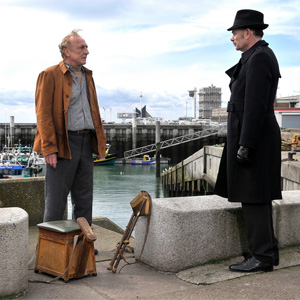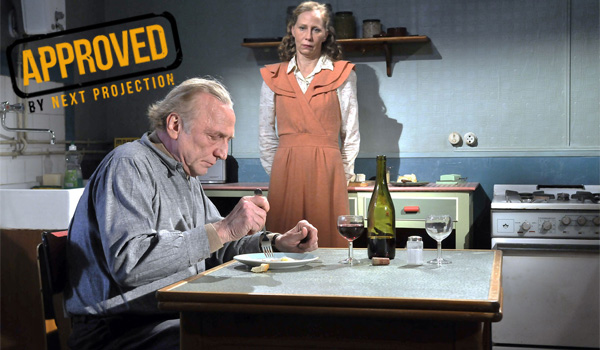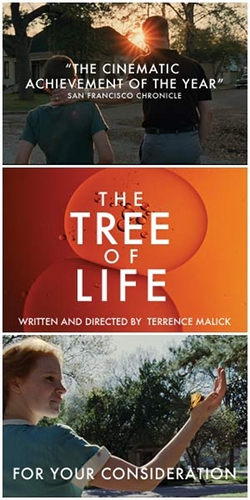Review: Le Havre (2011)
Cinema is often a reflection of the world, but it doesn’t have to be a mirror-perfect reflection of the way things are. It is allowed to be a romanticized version of the way things should be. It is allowed to be un-cynical, vibrant, colorful, and textured by the beautiful imperfections that make the world unique. It can be persuasive without being judgmental, and it can be poetic while it is delivering a pragmatic message. Le Havre delivers simple humanistic messages about the tangled nature of the world, and the bureaucratic gentrification that we have subjected ourselves to. It delivers these messages from a place of panged joy, as it both laments the way things are and shows us the way that things can be. It looks at the Kafkaesque charades that have stripped us of our basic human decency, and instead of pontificating on foreign policies that have created a system where helping another human-being could ever be the wrong thing to do, it shrugs its shoulders, drinks another glass of cheap wine, considers the crust on the bread and the magic of its orchestra of sounds, and laughs roguishly at the silliness of it all.
…it shrugs its shoulders, drinks another glass of cheap wine, considers the crust on the bread and the magic of its orchestra of sounds, and laughs roguishly at the silliness of it all.
 We live in an age of uncertainty and a shaken confidence of the way that the world should operate. Youth movements around the world are criticized for their lack of a coherent message, but objective certainties about the nature of the world are difficult to come by in an age of unintended consequences and failing systems. Some people hold steadfast to the old ways of thought and find themselves in the position of defending a system that promised us that A + B would always equal C and that if things aren’t done a certain way then everything will come crumbling down. It doesn’t have time to suffer the loveable scamps of the world, and one is punished for doing the right thing. Le Havre shows us that A + B can sometimes equal D, and that basic human decency is not something that should be legislated, or if it is the decent thing to do is disregard those rules and do what we know is right. We’ve been tricked in to betraying our inherently good nature by way of media manipulation, the perpetuation of fear, and the dehumanization of anyone that doesn’t look or act the way that we do. We’ve taken a sandblaster to the textures of the world and homogenized people and places and in doing so have lost the essence of what makes us great. Now we get our food from establishments that push for universal homogenization, have been placed in locations that will statistically provide the best foot-traffic, and have been robbed of texture and color so as not to alarm people to the fact that they are essentially being manipulated in to carrying the water for institutions that are fatally flawed.
We live in an age of uncertainty and a shaken confidence of the way that the world should operate. Youth movements around the world are criticized for their lack of a coherent message, but objective certainties about the nature of the world are difficult to come by in an age of unintended consequences and failing systems. Some people hold steadfast to the old ways of thought and find themselves in the position of defending a system that promised us that A + B would always equal C and that if things aren’t done a certain way then everything will come crumbling down. It doesn’t have time to suffer the loveable scamps of the world, and one is punished for doing the right thing. Le Havre shows us that A + B can sometimes equal D, and that basic human decency is not something that should be legislated, or if it is the decent thing to do is disregard those rules and do what we know is right. We’ve been tricked in to betraying our inherently good nature by way of media manipulation, the perpetuation of fear, and the dehumanization of anyone that doesn’t look or act the way that we do. We’ve taken a sandblaster to the textures of the world and homogenized people and places and in doing so have lost the essence of what makes us great. Now we get our food from establishments that push for universal homogenization, have been placed in locations that will statistically provide the best foot-traffic, and have been robbed of texture and color so as not to alarm people to the fact that they are essentially being manipulated in to carrying the water for institutions that are fatally flawed.
Le Havre cherishes the colors and textures of the people and places that remain seemingly untouched by this worldwide gentrification. Its camera is fascinated by the paint chipping from careworn walls, the vein as it swells in our protagonist’s head as he is flustered and affably trying to summon the right words, the droopy-face of his wife as she lovingly prepares his meals and can only sigh at his roguish tendencies, the dirt under our protagonist’s fingernails as he carefully wraps a simple yellow sun dress for his wife in a simple paper parcel bound together with string, the large and blemished nose of a doctor as he delivers bad news, the faded tattoos on the arms of pot-bellied bar patrons with bad teeth, and all of the idiosyncratic imperfections that make the world an interesting place to live in. It observes the “other” world that has evolved from various market research studies that have been going on as long as we have had the ability to market on a global scale, but does so at a distance. The shoeshine is not allowed entry in to this world as individuality and foolishness is not to be suffered. We are given glimpses of it to better illustrate the idiosyncratic beauty of the simpler world of imperfections and basic human decency. We see this other world in the uniforms of guards at a drab refugee internment camp, in the windows of shops that offer the same carefully arranged set of shoes in every country in the world, and we see it as we leave the safe-haven of the theater and drive through the streets of our own world as we ponder our own complacency with the state of things and our desperation when we realize that there is little that we can do.
Its camera is fascinated by the paint chipping from careworn walls, the vein as it swells in our protagonist’s head as he is flustered and affably trying to summon the right words, the droopy-face of his wife as she lovingly prepares his meals and can only sigh at his roguish tendencies, the dirt under our protagonist’s fingernails as he carefully wraps a simple yellow sun dress for his wife in a simple paper parcel bound together with string, the large and blemished nose of a doctor as he delivers bad news…
 We may not be able to escape the Kafkaesque institutions that have been constructed over top of us, but we need not make it easier for them. The only thing that you have control over is the way that you choose to interact with the people that come in direct contact with you. You can choose to filter every decision through the current law of the land and betray the essential decency that most of us possess, or you can simply allow your humanity to leak through to the surface and do what you know is essentially right. We can all take a lesson from our local shoeshine and prostrate ourselves before all of humanity. Instead of trying to control and manipulate the world we can take it as it comes, choosing instead to enjoy the simple joys that come from bread, wine, and good friends. Or we can grumble to ourselves as we move past the insufferable hobo that is plaguing the front of our store windows and wonder what in the hell it is he has to smile about.
We may not be able to escape the Kafkaesque institutions that have been constructed over top of us, but we need not make it easier for them. The only thing that you have control over is the way that you choose to interact with the people that come in direct contact with you. You can choose to filter every decision through the current law of the land and betray the essential decency that most of us possess, or you can simply allow your humanity to leak through to the surface and do what you know is essentially right. We can all take a lesson from our local shoeshine and prostrate ourselves before all of humanity. Instead of trying to control and manipulate the world we can take it as it comes, choosing instead to enjoy the simple joys that come from bread, wine, and good friends. Or we can grumble to ourselves as we move past the insufferable hobo that is plaguing the front of our store windows and wonder what in the hell it is he has to smile about.
















 Review: Funny Games (2007)
Review: Funny Games (2007) Review: Osaka Elegy (1936)
Review: Osaka Elegy (1936) Review: Miss Bala (2011)
Review: Miss Bala (2011) Review: Hidden (2005)
Review: Hidden (2005) Review: Watching TV With The Red Chinese (2012)
Review: Watching TV With The Red Chinese (2012)


